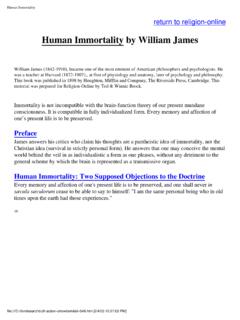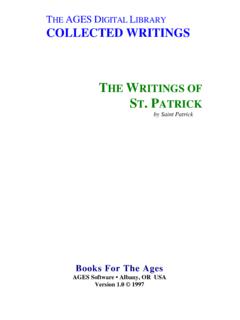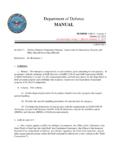Transcription of Institutes of the Christian Religion Vol. 4 - SABDA.org
1 THE AGES DIGITAL LIBRARYTHEOLOGYINSTITUTES OF THECHRISTIAN RELIGIONVOL. 4 Translated by Ford Lewis BattlesUsed by permission from The Westminster PressAll Rights ReservedB o o k s F o r T h e A g e s AGES Software Albany, OR USAV ersion 19982 BOOK 4 The External Means or Aims by Which God Invites Us Into theSociety of Christ and Holds Us ThereinCHAPTER 1 THE TRUE CHURCHF1 WITH WHICH AS MOTHEROF ALL THE GODLY WE MUST KEEP UNITY(The Holy Catholic Church, our mother, 1-4)1. THE NECESSITY OF THE CHURCHAs explained in the previous book, it is by the faith in the gospel thatChrist becomes ours and we are made partakers of the salvation andeternal blessedness brought by him.
2 Since, however, in our ignorance andsloth (to which I add fickleness of disposition) we need outward helps tobeget and increase faith within us, and advance it to its goal, God has alsoadded these aids that he may provide for our weakness. And in order thatthe preaching of the gospel might flourish, he deposited this treasure in thechurch. He instituted pastors and teachers [<490411>Ephesians 4:11]through whose lips he might teach his own; he furnished them withauthority; finally, he omitted nothing that might make for holy agreementof faith and for right order.
3 First of all, he instituted sacraments, which wewho have experienced them feel to be highly useful aids to foster andstrengthen faith. Shut up as we are in the prison house of our flesh, wehave not yet attained angelic rank. God, therefore, in his wonderfulprovidence accommodating himself to our capacity, has prescribed a wayfor us, though still far off, to draw near to , our plan of instruction now requires us to discuss the church,its government, orders, and power; then the sacraments; and lastly, thecivil At the same time we are to call back godly readers from those3corruptions by which Satan, in the papacy, has polluted everything Godhad appointed for our shall start, then, with the church, into whose bosom God is pleased togather his sons, not only that they may be nourished by her help andministry as long as they are infants and children, but also that they may beguided by her motherly care until they mature and at last reach the goal offaith.
4 For what God has joined together, it is not lawful to put asunder [<411009>Mark 10:9 p.], so that, for those to whom he is Father the churchmay also be And this was so not only under the law but alsoafter Christ s coming, as Paul testifies when he teaches that we are thechildren of the new and heavenly Jerusalem [<480426>Galatians 4:26].2. WHAT IS THE RELATIONSHIP OF CHURCH AND CREED?The article in the Creed in which we profess to believe the church refersnot only to the visible church (our present topic) but also to all God select, in whose number are also included the dead.
5 The word believe isused because often no other distinction can be made between God schildren and the ungodly, between his own flock and wild beasts, There isno good reason why many insert the preposition in. I admit that it ismore usual and is not without the support of antiquity, since the NiceneCreed, as reported in the Ecclesiastical History, adds the preposition?F4 Still, we should at the same time note from the writings of the fathers thatin early times it was accepted as beyond controversy that people shouldsay, I believe the church, not in the church.
6 So spoke Augustine andthat ancient writer (whoever he was) whose treatise On the Exposition ofthe Creed bears Cyprian s Besides, they clearly note that to addthe preposition would make it an improper expression, which opinionthey confirm by substantial reasoning. We testify that we believe in Godbecause our mind reposes in him as truthful, and our trust rests in him. Tosay in the church would be as inappropriate as in the forgiveness ofsins or in the resurrection of the body. Consequently, although I do notwish to dispute over words, I should prefer to use the proper phrase, onebetter fitted to express the matter, rather than to affect forms of speakingwhich needlessly obscure the purpose is for us to know that, even though the devil moves everystone to destroy Christ s grace, and though God s enemies also rage withthe same savage fury, it cannot be extinguished; nor can Christ s blood bemade barren, nay, even some good may come of it.
7 We must thus considerboth God s secret election and his inner call. For he alone knows who arehis [<550219>2 Timothy 2:19], and, as Paul says, encloses them under hisseal [<490113>Ephesians 1:13], except that they bear his insignia by whichthey may be distinguished from the reprobate. But because a small andcontemptible number are hidden in a huge multitude and a few grains ofwheat are covered by a pile of chaff, we must leave to God alone theknowledge of his church, whose foundation is his secret election. It is notsufficient, indeed, for us to comprehend in mind and thought the multitudeof the elect, unless we consider the unity of the church as that into whichwe are convinced we have been truly engrafted.
8 For no hope of futureinheritance remains to us unless we have been united with all othermembers under Christ, our church is called catholic, or universal, because there could not betwo or three churches unless Christ be torn asunder [cf. <460113>1 Corinthians 1:13] which cannot happen! But all the elect are so united inChrist [cf. <490122>Ephesians 1:22-23] that as they are dependent on oneHead, they also grow together into one body, being joined and knittogether [cf. <490416>Ephesians 4:16] as are the limbs of a body[<451205>Romans 12:5; <461017>1 Corinthians 10:17; 12:12, 27].
9 They aremade truly one since they live together in one faith, hope, and love, and inthe same Spirit of God. For they have been called not only into the sameinheritance of eternal life but also to participate in one God and Christ[<490530>Ephesians 5:30]. Although the melancholy desolation whichconfronts us on every side may cry that no remnant of the church is left,let us know that Christ s death is fruitful, and that God miraculouslykeeps his church as in hiding So it was said to Elijah, I have keptfor myself seven thousand men who have not bowed the knee before Baal [<111918>1 Kings 19:18 p.]
10 ].3. THE COMMUNION OF SAINTS This article of the Creed also applies to some extent to the outwardchurch, in that each of us should keep in brotherly agreement with all5 God s children, should yield to the church the authority it deserves, inshort, should act as one of the flock. Accordingly, the communion ofsaints is added. This clause, though generally omitted by the ancients,F7ought not to be overlooked, for it very well expresses what the church is as if one said that the saints are gathered into the society of Christ onthe principle that whatever benefits God confers upon them, they shouldin turn share with one another.













